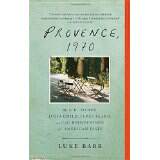Book Review: “Provence 1970” by Luke Barr
by Jan
I’ve just pulled a pile of old cook books out of my bookshelf.
They are all published in the 60s and 70s, and the titles are:
Posh Food Andre Launay
Ou est le garlic? Len Deighton
French Provincial Cooking Elizabeth David
Mastering the Art of French Cooking Vol 1 & 2 Simone Beck & Julia Child
I used to have Richard Olney’s The French Menu Cookbook, but I moved house and unfortunately it underwent an efficient cull, and wound up in a second-hand shop.
When I was doing a Cordon Bleu course in London the textbook was Cordon Bleu Cookery by Rosemary Hume and Muriel Downes. It got battered to death and regrettably went to cookbook heaven. But it was not my bible; during that period Elizabeth David’s French Provincial Cooking performed that function. I used to read it in bed, and every weekend I would cook a recipe from it.
I would go to the Portobello Road market to buy the ingredients, and Saturday afternoons were spent in the kitchen cooking up a storm. My flatmates were very happy to be the guinea pigs.
Even though David’s French Provincial Cooking was great to read and salivate over, and I never found the recipes complicated. It all seemed obvious how to make Coq au Vin, for example. Rustic French dishes seemed to be de rigueur in the early 70s.
Then I discovered Mastering the Art of French Cooking, and my reaction was something like “But I’ve done all this.” However, it was really good for explaining more complicated processes and terms, ie. before videos demonstrating all this arrived on the internet.
Ou est le Garlic? was an eye-catching title for me, being a garlic-addict. This is an abridged version of Child’s and David’s books – a summary, really, of French cooking and terms at a time when the Anglo world discovered the wonders of French food.
Fast forward to now, and Provence 1970 has been on the bookshelves for a couple of years, written by MFK Fisher’s grand-nephew, Luke Barr. MF, as he called her, called Child the “Minister for Measures” which explains the detailed recipes for Mastering…. 1&2. She wanted to democratize French cooking for Americans, which made me think they must be really culinarily illiterate.
According to MF, Richard Olney was a classicist and perfectionist. Making pâtés is a time-consuming process and he had the patience for this. He would also be happy to make more rustic dishes from scratch such as pâté de campagne. He was more interested in flavours than prestigious and expensive ingredients. This was considered Bohemian rather than snobbish. He was also more interested in local and seasonal ingredients to make these more rustic dishes from scratch, rather than processed stuff.
Barr wrote about the relationships between these cooks and writers which were not always smooth. Olney was considered bristly and difficult. Child was a bit pedantic with measurements and details. Her relationship with Beck was wobbly as a result of this, and complicated because it was on the Beck family’s property where Child and her husband stayed. James Beard had health problems not relationship problems.
Olney, according to Barr, seemed to be the most irascible and disparaging of the others. He considered himself the only one who was authentic. If this book was a film, Olney would have provided enough conflict to make it good.
In the late 60s and early 70s there was a change in American cooking and taste. By that time people became used to buying canned convenience foods, therefore not cooking so much from scratch. Whilst not everyone was becoming culinarily illiterate, the rise in the availability of industrial convenience foods certainly made the household cook less independent and confident. This was the reason Mastering…..Vol 1 & 2 became so popular: those volumes explained everything in detail.
French cooking became less stuffy, theatrical and formal, and more accessible to the majority. This was the period of a quest for democracy, ie. civil rights, Vietnam war, free speech, feminism and environmental concerns. A similar shift of sentiment was happening in cuisine; the baton representing the bohemian food culture in Sonoma County, was handed to Alice Waters from Elizabeth David, Richard Olney and MFK Fisher. Chefs were opening restaurants offering food which was local, seasonal and ethically produced. And treated simply.
The emphasized the primacy of the produce, best sold in local markets. This food ethic and principles filtered down to Australia and New Zealand, and taken up by, for example, Tony’s Bon Goût in Sydney, and later the Bayswater Brasserie.